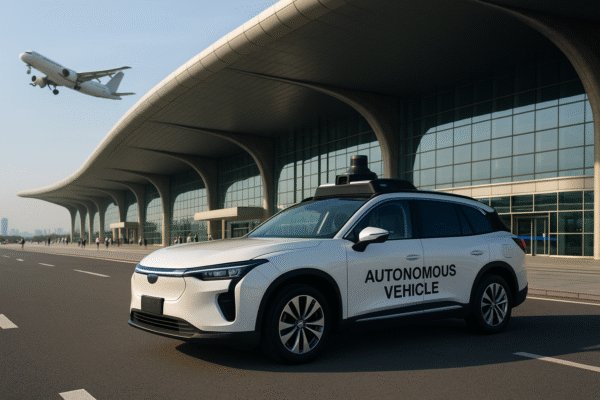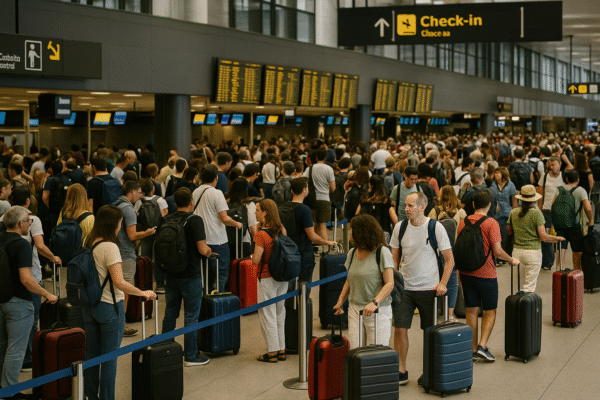The Gulf Cooperation Council (GCC) countries are entering a transformative phase in tourism through next-generation travel technologies. Backed by national visions like Saudi Arabia’s Vision 2030, the UAE’s Smart Dubai initiative, and Qatar’s National Tourism Sector Strategy 2030, the region is becoming a global travel tech powerhouse. From AI-powered personalization to autonomous transport and digital pilgrimage services, 2025 is poised to mark a new era in Middle Eastern tourism.
AI-Powered Travel: Personalization at Scale
Artificial Intelligence is reshaping how travelers plan, book, and experience destinations. Platforms like Wego, headquartered in Dubai and Singapore, use machine learning to provide customized travel deals from over 5,000 hotels and airlines. Jordan-based Viavii leverages AI to connect travelers with immersive experiences and local hosts, catering to demand for culturally authentic travel.
Saudi startup Humain is developing large-scale AI infrastructure to power industries including tourism. Emirates Airlines, already using AI chatbots for customer support, is expanding into predictive AI for itinerary optimization and real-time travel alerts.
Autonomous Vehicles: Robotaxis Hit GCC Roads
Autonomous vehicles are no longer a futuristic concept in the Gulf. Chinese firms WeRide, Pony.ai, and Baidu are actively launching robotaxi services in the UAE and Saudi Arabia. Dubai’s Roads and Transport Authority has announced partnerships for operational launches by late 2025. In Abu Dhabi, Baidu’s alliance with Autogo will see robotaxi trials by year-end.
Saudi Arabia is also investing in urban air mobility, with flying taxis planned for Riyadh by 2026. These electric vertical take-off and landing (eVTOL) aircraft will drastically reduce intra-city travel times, aligning with Saudi’s futuristic city projects like NEOM.
Smart Airports: Biometric Efficiency and AI-Driven Comfort
Airports across the Middle East are becoming tech-centric hubs. Dubai International Airport (DXB) is enhancing facial recognition and AI-based security, while Abu Dhabi International Airport integrates biometric e-gates and touchless check-ins.
King Abdulaziz International Airport in Jeddah is modernizing with AI-powered crowd control and baggage handling systems. These innovations, according to the International Air Transport Association (IATA), reduce average passenger processing times by up to 30%.
Blockchain Travel Transactions: Safety and Transparency
Blockchain is being adopted to enhance transparency and security across the travel ecosystem. The Saudi Public Investment Fund (PIF) is incorporating blockchain for digital visa management and hotel bookings.
Tourists can now store travel documents, including IDs and vaccine records, in blockchain-secured digital wallets, replacing paper-based bureaucracy with tamper-proof records. This streamlines cross-border mobility and enhances traveler confidence.
Digital Health Passports and Smart Pilgrimage Technology
Saudi Arabia is pioneering digital pilgrimage solutions. Platforms like Umrahme facilitate Umrah visa applications, accommodation, and itinerary planning through a single app. In partnership with the Ministry of Hajj and Umrah, digital health passports validate COVID-19 and vaccination status, ensuring safety during Hajj and Umrah.
Meanwhile, virtual reality (VR) mosque tours and AI-powered guidance bots in Makkah and Madinah are transforming religious tourism. These tools assist non-Arabic speakers and help manage crowd control during peak pilgrimage seasons.
Sustainable Travel: Green Mobility and Eco Resorts
With increasing awareness of climate change, sustainable tourism is central to GCC strategies. The Red Sea Project in Saudi Arabia is developing luxury resorts powered by 100% renewable energy, along with eco-sensitive marine tourism.
The UAE is expanding electric vehicle infrastructure and EV tourism routes, supporting its goal of net-zero emissions by 2050. Airlines like Emirates and Etihad are investing in Sustainable Aviation Fuel (SAF) to reduce the carbon footprint of long-haul travel.
Digital Travel Platforms and Booking Innovations
Digital travel agencies are replacing traditional tour operators. Wego, Cleartrip, and Viavii are leading the charge in mobile-first booking, real-time customization, and cashless payments.
These platforms use tourism analytics to track booking behaviors, predict peak travel periods, and offer dynamic pricing. UAE tourism authorities are leveraging this data to shape visitor flow and destination marketing strategies.
Data-Driven Tourism: Smart Decisions for Smart Destinations
Middle Eastern tourism boards are embracing big data for smarter decision-making. Visit Saudi uses AI-generated demand forecasts to optimize infrastructure and launch marketing campaigns. The UAE Ministry of Economy analyzes data from smart hotels, transport systems, and booking platforms to enhance traveler satisfaction and address overtourism.
In Qatar, preparations for large-scale events like Expo 2027 and Asian Games 2030 are fueled by predictive analytics, enabling the country to scale operations while maintaining quality experiences.
Conclusion: The GCC’s Digital Leap into Global Tourism Leadership
By 2025, the Middle East will stand among the world’s most advanced travel technology regions. From Dubai’s autonomous taxis to Saudi Arabia’s AI-powered pilgrimage services, the GCC is not just catching up but setting global benchmarks in smart, sustainable, and secure tourism.
Tourism stakeholders, from government ministries to private startups, are working synergistically to deliver personalized, seamless, and eco-conscious travel experiences. As travel demand in the region surges, tech adoption ensures that the Middle East remains not only competitive—but visionary—in shaping the future of global tourism.
For more travel news like this, keep reading Global Travel Wire


















